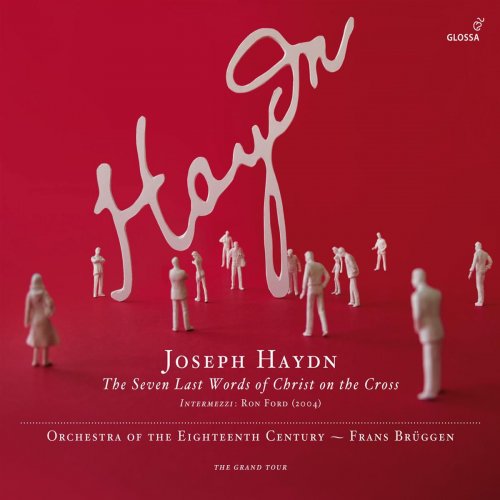
Frans Brüggen - Haydn: The Seven Last Words of Christ on the Cross (2009)
BAND/ARTIST: Frans Brüggen
- Title: Haydn: The Seven Last Words of Christ on the Cross
- Year Of Release: 2009
- Label: Glossa
- Genre: Classical
- Quality: FLAC (tracks)
- Total Time: 48:59 min
- Total Size: 197 MB
- WebSite: Album Preview
Tracklist:
1. Introduzione. Maestoso ed Adagio
2. Sonata I. Largo ('Pater, dimitte illis, quia nesciunt, quid faciunt')
3. Sonata II. Grave e cantabile ('Hodie mecum eris in Paradiso')
4. Sonata III. Grave ('Mulier, ecce filius tuus')
5. Sonata IV. Largo ('Deus meus, utquid dereliquisti me -')
6. Sonata V. Adagio ('Sitio')
7. Sonata VI. Lento ('Consummatum est')
8. Sonata VII. Largo ('In manus tuas, Domine, commendo spiritum meum')
9. Il Terremoto. Presto e con tutta la forza
1. Introduzione. Maestoso ed Adagio
2. Sonata I. Largo ('Pater, dimitte illis, quia nesciunt, quid faciunt')
3. Sonata II. Grave e cantabile ('Hodie mecum eris in Paradiso')
4. Sonata III. Grave ('Mulier, ecce filius tuus')
5. Sonata IV. Largo ('Deus meus, utquid dereliquisti me -')
6. Sonata V. Adagio ('Sitio')
7. Sonata VI. Lento ('Consummatum est')
8. Sonata VII. Largo ('In manus tuas, Domine, commendo spiritum meum')
9. Il Terremoto. Presto e con tutta la forza
Recorded live in Utrecht (Vredenburg) and in Leiden (Stadsgehoorzaal), Netherlands, in November 2004.
The commission came from the port city of Cádiz, in southern Spain. Joseph Haydn had been invited to compose orchestral passion music for performance during Holy Week. The Seven Last Words of Christ on the Cross, which contributed significantly to Haydn's international reputation, also exists in versions for string quartet and piano, and as an oratorio, but the symphonic version presented here is the original.The composer himself considered this one of his finest works, and today, more than two centuries later, we can only concur. Haydn 'translated' Christ's last words, culled from the various gospels, into seven slow, sober and imposingly spiritual movements.After Cádiz the work became removed from its liturgical context. Attempts have been made to reconstruct the original setting, but in a concert hall, spoken commentary only interferes with the music, even more so on a recording. In respecting this objection, but at the same time desiring to create a meaningful space between the movements, Frans Brüggen invited the Dutch-American composer Ron Ford (Kansas City, 1959) to compose instrumental intermezzi. "This was a real challenge," says Ford. "I looked for a balance between contrast and creating suitable connections.With this sort of commission you have to ask yourself: what haven't we had yet? Haydn is punctual, logical, direct.What is missing is a sense of swell and ebb. I explored that route, with the sound of the Orchestra of the 18th Century in mind.Their breathing style of playing is unique in the world."
The commission came from the port city of Cádiz, in southern Spain. Joseph Haydn had been invited to compose orchestral passion music for performance during Holy Week. The Seven Last Words of Christ on the Cross, which contributed significantly to Haydn's international reputation, also exists in versions for string quartet and piano, and as an oratorio, but the symphonic version presented here is the original.The composer himself considered this one of his finest works, and today, more than two centuries later, we can only concur. Haydn 'translated' Christ's last words, culled from the various gospels, into seven slow, sober and imposingly spiritual movements.After Cádiz the work became removed from its liturgical context. Attempts have been made to reconstruct the original setting, but in a concert hall, spoken commentary only interferes with the music, even more so on a recording. In respecting this objection, but at the same time desiring to create a meaningful space between the movements, Frans Brüggen invited the Dutch-American composer Ron Ford (Kansas City, 1959) to compose instrumental intermezzi. "This was a real challenge," says Ford. "I looked for a balance between contrast and creating suitable connections.With this sort of commission you have to ask yourself: what haven't we had yet? Haydn is punctual, logical, direct.What is missing is a sense of swell and ebb. I explored that route, with the sound of the Orchestra of the 18th Century in mind.Their breathing style of playing is unique in the world."
As a ISRA.CLOUD's PREMIUM member you will have the following benefits:
- Unlimited high speed downloads
- Download directly without waiting time
- Unlimited parallel downloads
- Support for download accelerators
- No advertising
- Resume broken downloads


